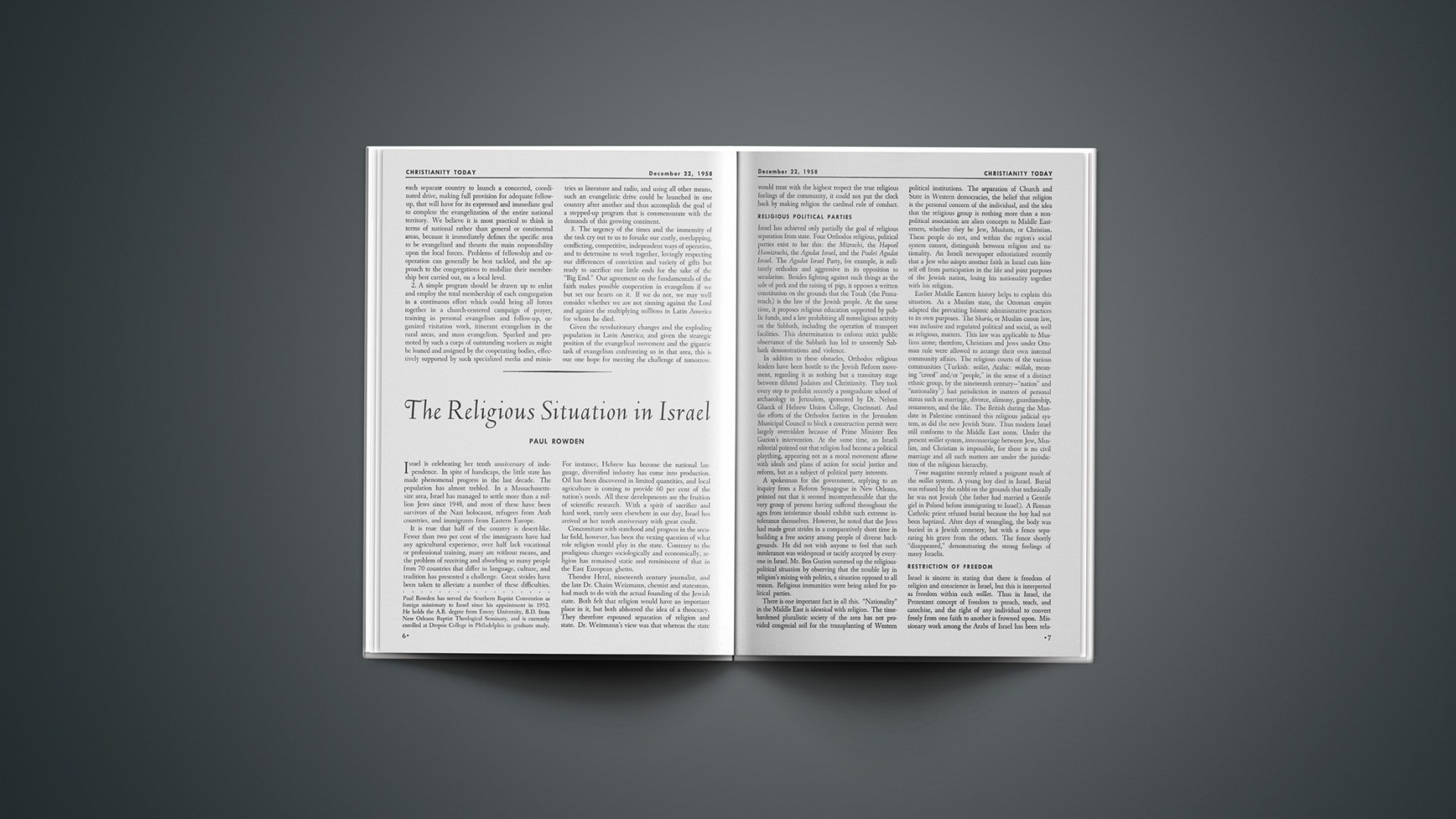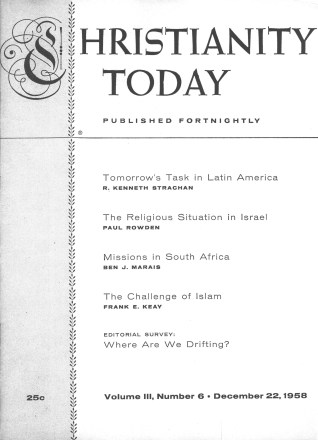Israel is celebrating her tenth anniversary of independence. In spite of handicaps, the little state has made phenomenal progress in the last decade. The population has almost trebled. In a Massachusetts-size area, Israel has managed to settle more than a million Jews since 1948, and most of these have been survivors of the Nazi holocaust, refugees from Arab countries, and immigrants from Eastern Europe.
It is true that half of the country is desert-like. Fewer than two per cent of the immigrants have had any agricultural experience, over half lack vocational or professional training, many are without means, and the problem of receiving and absorbing so many people from 70 countries that differ in language, culture, and tradition has presented a challenge. Great strides have been taken to alleviate a number of these difficulties.
For instance, Hebrew has become the national language, diversified industry has come into production. Oil has been discovered in limited quantities, and local agriculture is coming to provide 60 per cent of the nation’s needs. All these developments are the fruition of scientific research. With a spirit of sacrifice and hard work, rarely seen elsewhere in our day, Israel has arrived at her tenth anniversary with great credit.
Concomitant with statehood and progress in the secular field, however, has been the vexing question of what role religion would play in the state. Contrary to the prodigious changes sociologically and economically, religion has remained static and reminiscent of that in the East European ghetto.
Theodor Herzl, nineteenth century journalist, and the late Dr. Chaim Weizmann, chemist and statesman, had much to do with the actual founding of the Jewish state. Both felt that religion would have an important place in it, but both abhorred the idea of a theocracy. They therefore espoused separation of religion and state. Dr. Weizmann’s view was that whereas the state would treat with the highest respect the true religious feelings of the community, it could not put the clock back by making religion the cardinal rule of conduct.
Religious Political Parties
Israel has achieved only partially the goal of religious separation from state. Four Orthodox religious, political parties exist to bar this: the Mizrachi, the Hapoel Hamizrachi, the Agudat Israel, and the Poalei Agudat Israel. The Agudat Israel Party, for example, is militantly orthodox and aggressive in its opposition to secularism. Besides fighting against such things as the sale of pork and the raising of pigs, it opposes a written constitution on the grounds that the Torah (the Pentateuch) is the law of the Jewish people. At the same time, it proposes religious education supported by public funds, and a law prohibiting all nonreligious activity on the Sabbath, including the operation of transport facilities. This determination to enforce strict public observance of the Sabbath has led to unseemly Sabbath demonstrations and violence.
In addition to these obstacles, Orthodox religious leaders have been hostile to the Jewish Reform movement, regarding it as nothing but a transitory stage between diluted Judaism and Christianity. They took every step to prohibit recently a postgraduate school of archaeology in Jerusalem, sponsored by Dr. Nelson Glueck of Hebrew Union College, Cincinnati. And the efforts of the Orthodox faction in the Jerusalem Municipal Council to block a construction permit were largely overridden because of Prime Minister Ben Gurion’s intervention. At the same time, an Israeli editorial pointed out that religion had become a political plaything, appearing not as a moral movement aflame with ideals and plans of action for social justice and reform, but as a subject of political party interests.
A spokesman for the government, replying to an inquiry from a Reform Synagogue in New Orleans, pointed out that it seemed incomprehensible that the very group of persons having suffered throughout the ages from intolerance should exhibit such extreme intolerance themselves. However, he noted that the Jews had made great strides in a comparatively short time in building a free society among people of diverse backgrounds. He did not wish anyone to feel that such intolerance was widespread or tacitly accepted by everyone in Israel. Mr. Ben Gurion summed up the religious-political situation by observing that the trouble lay in religion’s mixing with politics, a situation opposed to all reason. Religious immunities were being asked for political parties.
There is one important fact in all this. “Nationality” in the Middle East is identical with religion. The time-hardened pluralistic society of the area has not provided congenial soil for the transplanting of Western political institutions. The separation of Church and State in Western democracies, the belief that religion is the personal concern of the individual, and the idea that the religious group is nothing more than a non-political association are alien concepts to Middle Easterners, whether they be Jew, Muslum, or Christian. These people do not, and within the region’s social system cannot, distinguish between religion and nationality. An Israeli newspaper editorialized recently that a Jew who adopts another faith in Israel cuts himself off from participation in the life and joint purposes of the Jewish nation, losing his nationality together with his religion.
Earlier Middle Eastern history helps to explain this situation. As a Muslim state, the Ottoman empire adapted the prevailing Islamic administrative practices to its own purposes. The Sharia, or Muslim canon law, was inclusive and regulated political and social, as well as religious, matters. This law was applicable to Muslims alone; therefore, Christians and Jews under Ottoman rule were allowed to arrange their own internal community affairs. The religious courts of the various communities (Turkish: millet, Arabic: millah, meaning “creed” and/or “people,” in the sense of a distinct ethnic group, by the nineteenth century—“nation” and “nationality”) had jurisdiction in matters of personal status such as marriage, divorce, alimony, guardianship, testaments, and the like. The British during the Mandate in Palestine continued this religious judicial system, as did the new Jewish State. Thus modern Israel still conforms to the Middle East norm. Under the present millet system, intermarriage between Jew, Muslim, and Christian is impossible, for there is no civil marriage and all such matters are under the jurisdiction of the religious hierarchy.
Time magazine recently related a poignant result of the millet system. A young boy died in Israel. Burial was refused by the rabbi on the grounds that technically he was not Jewish (the father had married a Gentile girl in Poland before immigrating to Israel). A Roman Catholic priest refused burial because the boy had not been baptized. After days of wrangling, the body was buried in a Jewish cemetery, but with a fence separating his grave from the others. The fence shortly “disappeared,” demonstrating the strong feelings of many Israelis.
Restriction Of Freedom
Israel is sincere in stating that there is freedom of religion and conscience in Israel, but this is interpreted as freedom within each millet. Thus in Israel, the Protestant concept of freedom to preach, teach, and catechise, and the right of any individual to convert freely from one faith to another is frowned upon. Missionary work among the Arabs of Israel has been relatively free from interference, but this is not true in the Jewish field. Organizations have been formed to combat Christian activities among the Jews; and through various pressures of personal, social and economic nature, life is extremely difficult for a Jewish convert to Christianity in Israel. Consequently, there are Israeli Jews who secretly are believers or in sympathy with the Christian faith, but are fearful of open proclamation.
At the present time, there are approximately 50,000 nominal Christians in Israel, divided up among the nine recognized Christian millets—such as the Greek Orthodox, the Maronite, and the Roman Catholic. Protestants, arriving late on the scene, do not have recognized millet status. However, some groups are allowed to perform certain personal status functions such as marriage. A few of the Protestant groups (using the term broadly) would accept millet recognition if the government should grant it, but most are unwilling to sacrifice the principles of complete religious freedom, or to take over civil court functions.
Officially, the government’s treatment of Protestant missionaries and congregations has been quite proper. However, it has been difficult for many groups to obtain visas for new workers or for present Christian workers to continue the renewal of their visas. Independent missionaries or those representing small denominations have found it very difficult to remain in Israel, or to return to Israel after a furlough. By misrepresenting their purpose for coming to Israel, some of these brought about their own difficulties.
In dealing with this little land, one must keep in mind that 10 years is a brief period. In evaluating the Israeli and his attitudes toward Christianity, one must recognize that the Jew has formed his opinion of Christianity over a long period of time in the crucible of suffering at the hands of so-called “Christians” in Europe. The fact that the Jews have been banned at one time from living in France, Spain, and England, tortured and killed in the Spanish Inquisition, bound to the ghetto and penuary, and slaughtered by German soldiers contributes to an almost insurmountable barrier between Christianity and Judaism.
The words “Gentile” and “Christian” are synonymous to the average Jew as he thinks of Americans and Europeans. Consequently, he judges Christianity in the light of Gentile behavior. Moreover, anti-Semitism and intolerance are not lost arts to many “devout” Christians.
Israel is struggling today for her very survival. Surrounded on all sides, except for 177 miles of sea-coast, by countries that have vowed to exterminate her and her people, Israel can little afford to favor any factor which may bring dissension among her people. But the exercise of genuine Christian charity, patience, and sympathy on the part of Protestants will nonetheless be effective as Israel faces the uncertain future.
END
Paul Rowden has served the Southern Baptist Convention as foreign missionary to Israel since his appointment in 1952. He holds the A.B. degree from Emory University, B.D. from New Orleans Baptist Theological Seminary, and is currently enrolled at Dropsie College in Philadelphia in graduate study.










